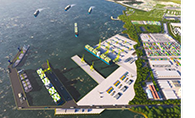Container monitoring is not needed as much as a reformed civil service
 The Philippines is engaged in a battle between regulators and the regulated in a conflict that in one form or another is being played out throughout the western world. The Philippines is engaged in a battle between regulators and the regulated in a conflict that in one form or another is being played out throughout the western world.
The Manila-based Bureau of Customs (BOC) supposedly seeks to ward off dangers to protect the public by imposing considerable expense on the transport sector to monitor the location and contents of every container on the road in real time.
Shippers will have to hire personnel to see that this is done to every container moving to and from ports and harbours in this vast archipelago of a nation in the South China Sea. In a country of 7,000 islands that means a lot of inspections of boxes here and there and everywhere - plus much inconvenience and expense to those afflicted with this supposed improvement.
Not surprisingly, the exporters were the first to complain. Surely, they said, customs does not have to check every container leaving the country because however harmful its contents may be, it is leaving and poses no domestic threat.
Objecting, Philippine Exporters Confederation president Sergio Ortiz-Luis said his organisation is in talks with the BoC "towards the exemption of exports from this because most of our logistics providers use GPS (global positioning system).
This news came after the Semiconductor and Electronics Industries in the Philippines Foundation (SEIPI) also protested, speaking of the redundancy of BOC's monitoring E-TRACC system.
SEIPI president Danilo Lachica also complained of the cost to exporters PHP1 million (US$17,344) to PHP2 million on top of the rising logistics costs.
What was the danger unfettered movement risked? Well, it turns out that in the export field, what is greatly feared is that products with lower prices per stock keeping unit, might well find their way to unauthorised buyers whose purchases would disrupt the smooth functioning of domestic supply chains.
"But," protested Mr Lachica, "there has been no record of export diversion to the domestic market because exporters need to ship these goods; otherwise, they don't get paid. So E-TRACC is redundant and an extra cost and time for exporters."
But all is settled. Launched in 2020 through Customs Memorandum Order No. 04-2020, the BOC's E-TRACC enables real-time monitoring of inland movements of containerised goods.
With the use of a GPS-enabled tracking device, the system secures the transport of the goods and prevents diversion and tampering.
In July 2022, the BoC fully implemented E-TRACC on all containers processed with no exceptions.
British Chamber of Commerce of the Philippines executive director Chris Nelson said he understands why there is a request for the system to be waived for exporters, where cargo diversion is not a concern.
"The issue is obviously for imports. While we haven't heard particularly of this system from our companies, what I would say is that we support things that strengthen and support legitimate sales," said Mr Nelson.
In the current US presidential election campaign it was recently revealed that the Democratic vice presidential candidate, Tim Walz, was credited with improving the employment numbers in his state of Minnesota. It was later revealed that the overwhelming majority of these new jobs were additions of the civil service payroll.
Far from being exceptional in the western world, this is the standard way governments use to boost employment numbers by increasing public spending. Even forgiving student loans allows students to re-borrow - most of them probably assuming that the government will bail them out again when payment becomes due. |